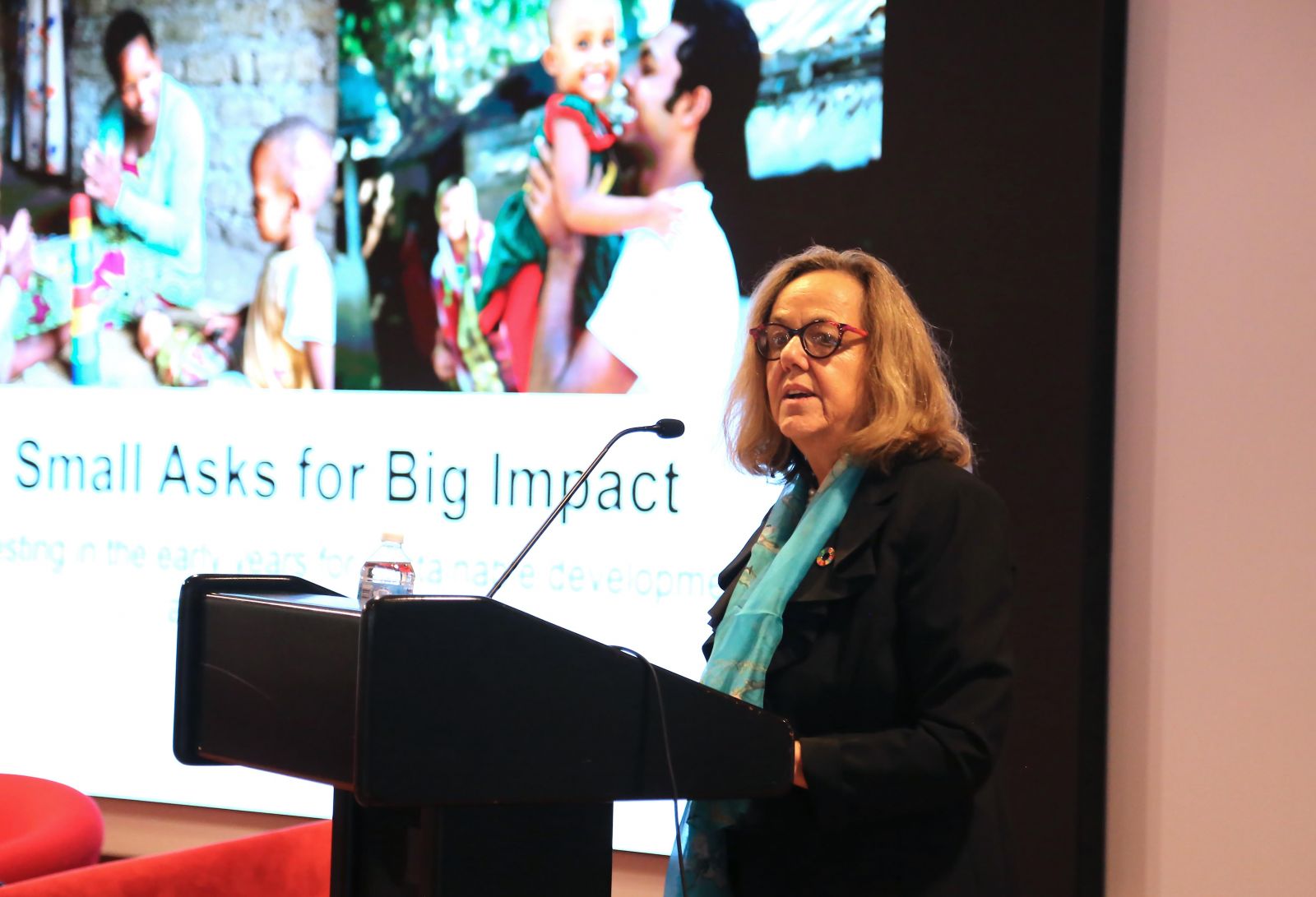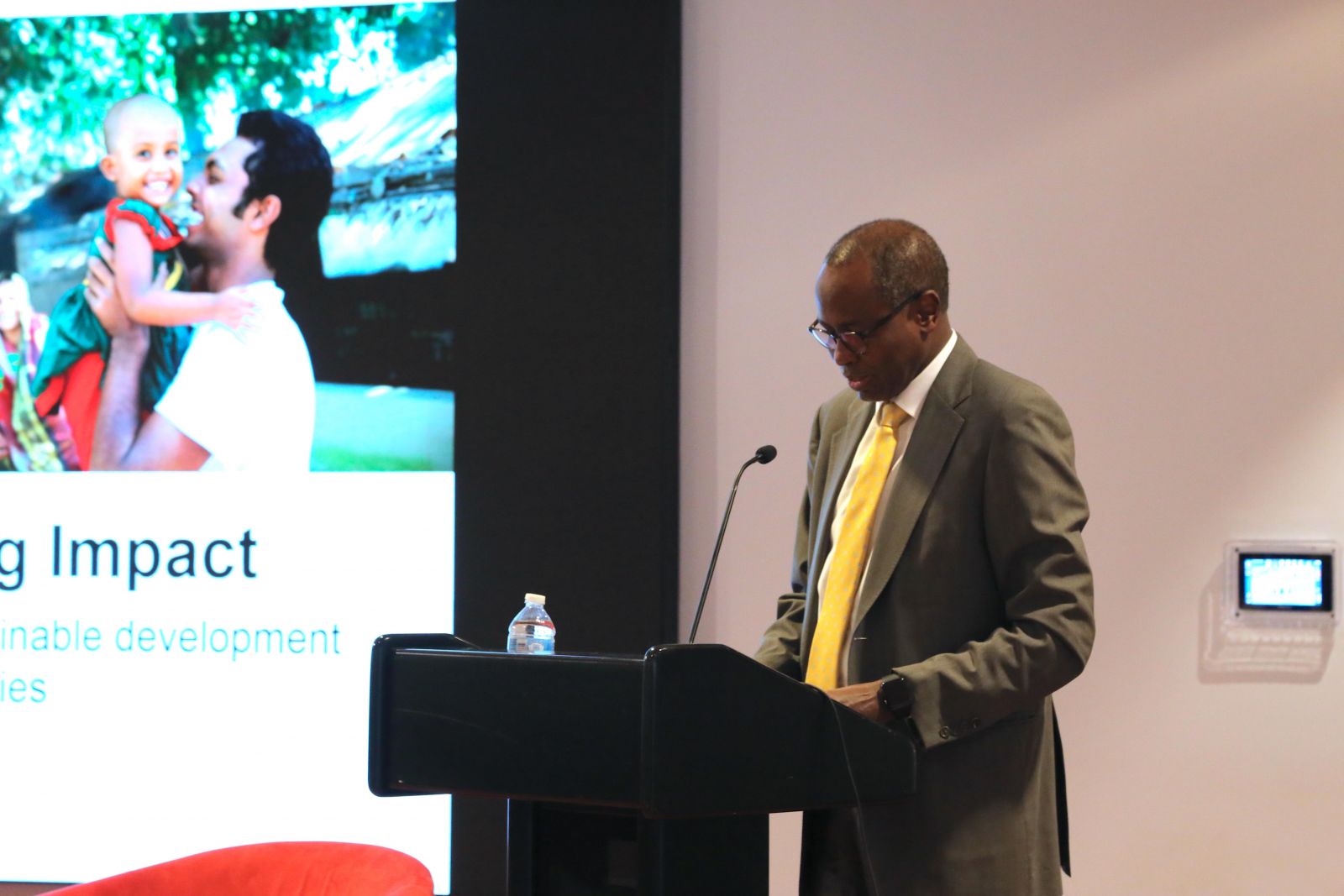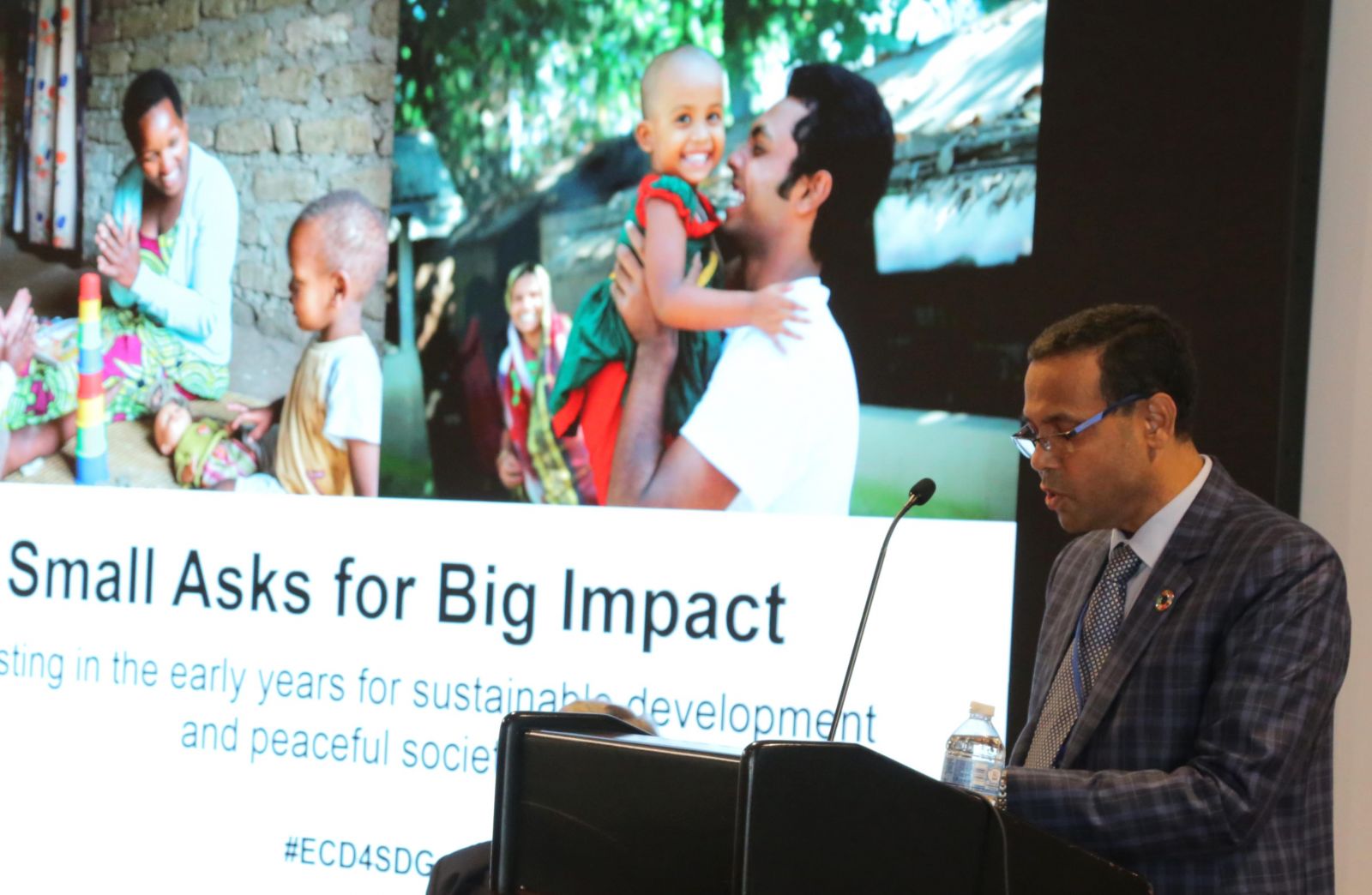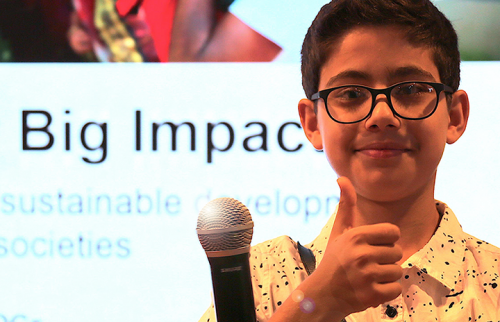
NEW YORK, NY—On 17 July 2019, the Early Childhood Peace Consortium (ECPC) co-hosted a special event at UNICEF House entitled, Small Asks for BIG Impact: Investing in the Early Years for Sustainable Development and Peaceful Societies.The opportune event coincided with the annual United Nations High-level Political Forum on Sustainable Development (HLPF2019) . It drew a crowded and captivated audience of people representing multiple societal sectors. The event accentuated early childhood (age 0-8) as a critical window of opportunity to invest in early childhood development (ECD) services that offer a unique opportunity to make a cost-effective and sustainable impact on interrupting cycles of poverty and violence.
Event video slideshow
Event speakers
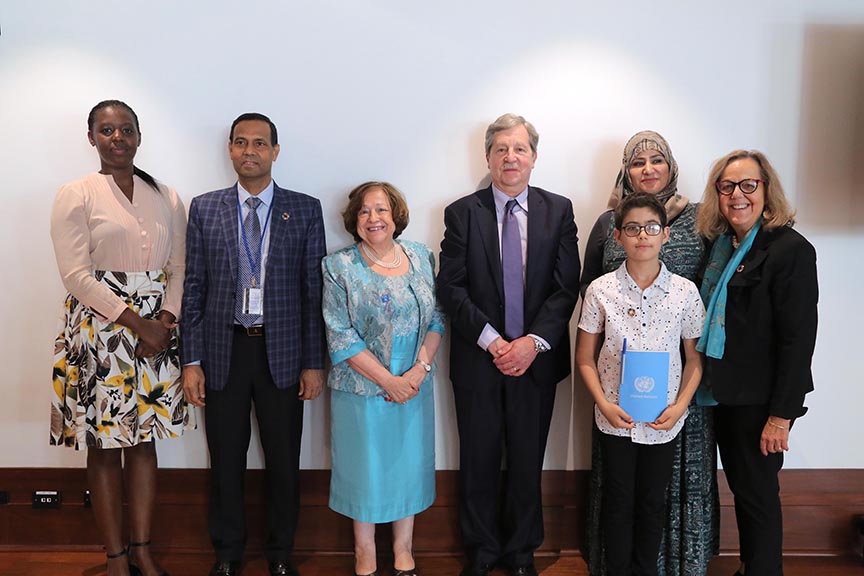
A distinguished panel of seven including high-level experts from science, practice, governance and civil society presented on the growing evidence base for investing early, including how early childhood programs and services contribute to multiple 2030 Sustainable Development Goals (SDGs) and to building ‘The Culture of Peace’. Speakers include (in order of appearance):
- Joan Lombardi, Ph.D., Director, Early Opportunities LLC; former US Deputy Assistant Secretary for Early Childhood Development (2009-2011) [Moderator]
- DED Mr. Omar Abdi, Deputy Executive Director, UNICEF
- Charles Nelson, Ph.D., Director of Research at Boston Children’s Hospital; Professor of Pediatrics, Harvard Medical School
- Dr. Anita Asiimwe, Coordinator, National Early Childhood Development Program, Rwanda
- Mr. Md. Sherajul Islam, Vice Minister, Bangladesh Ministry of Health and Family Welfare
- Rima Salah, Ph.D., Chair, Early Childhood Peace Consortium; former Assistant Secretary-General of the United Nations
- Ms. Nargis Bigzad, Direct Response Associate, International Rescue Committee
► To learn more about these experts, read their speaker biographies.
► EVENT HIGHLIGHTS
Talk 1. ECD drives progress towards the 2030 Sustainable Development Goals
Moderator, Dr. Joan Lombardi welcomed audience members and expressed gratitude to event sponsor, the Foundation Open Society Institute in cooperation with the Early Childhood Program of the Open Society Foundations, and to co-hosts: the Permanent Missions of Bangladesh and Rwanda, UNICEF, the Moving Lines Alliance, the Early Childhood Peace Consortium (ECPC) and the NGO Committee on Migration.
She underscored the urgent need for the global community to meet every one of the seventeen 2030 Sustainable Development Goals (SDGs) to alleviate the global suffering of children and families whose lives have been affected by conflict, displacement and natural disaster. She emphasized “Far too many young children have spent their entire early childhood living under these difficult conditions, knowing no other life. Their families are yearning for an end to war, displacement and crisis.” She continued, “But, there is another way. The SDGs provide us an important set of guideposts from towards which we strive for poverty reduction, equality of opportunity and a peaceful and inclusive society. Young children and families are depending on us to reach those goals.”
Dr. Lombardi pointed out the alignment between the SDGs and the Nurturing Care Framework, which is designed to help children ‘survive and thrive to transform health and human potential’ through a five-point focus on safety and security, health, nutrition, responsive parenting and early learning. She referenced a recent paper by the Moving Minds Alliance inwhich 26 active humanitarian response plans were reviewed, showing a shortfall in all five critical areas for children living in crisis situations. “We need to change that and that’s why we’re here”, she said.
Joan Lombardi, Ph.D. is Director of Early Opportunities LLC and former US Deputy Assistant Secretary for Early Childhood Development (2009-2011).
Talk 2. The triple nexus: Humanitarian response, sustainable development and peacebuilding
In his opening remarks, Mr. Omar Abdi quoted from the 2030 Agenda that states “There can be no sustainable development without peace and no peace without sustainable development.” He emphasized that investment in early childhood development (ECD) services can yield some of the greatest public policy returns on investment, particularly for poor marginalized or conflict affected communities.
He spoke on behalf of the 75 million children under five years of age who are currently living in areas of conflict and underlined the need to increase investments in their holistic development. These developmental areas include education, health, nutrition, protection, mental health, psychosocial support as well as caregiver support. He emphasised that continual access to these services “are vital to both the immediate and long-term wellbeing of all children”, but especially for those impacted by “extreme adversity, crisis and displacement”.
“UNICEF encounters around 300 humanitarian situations every year.” He further added that in 2018, UNICEF and its partners provided “3.6 million children and caregivers access to psychosocial support and 6.9 million access to formal or non-formal education, including early learning”. He acknowledged Rwanda and Bangladesh and other governments and partners for joining UNICEF in the commitment “towards giving every young child the nurture and care they need”.
He continued, “Today we go farther to recognize that ECD is integral to achieving the Global Goals. It’s an opportunity to address the triple nexus, a concept that refers to the interrelatedness between humanitarian response, sustainable development and peace building.” He concluded, “An entire generation is at risk of not reaching their full potential. We must live up to the promises enshrined in the Convention on the Rights of the Child, ensuring the right to development and allowing every child to survive and thrive.”
DED Mr. Omar Abdi is Deputy Executive Director for programmes at UNICEF.
Talk 3. “Pay now or pay more later”: The long-term impacts of early adversity
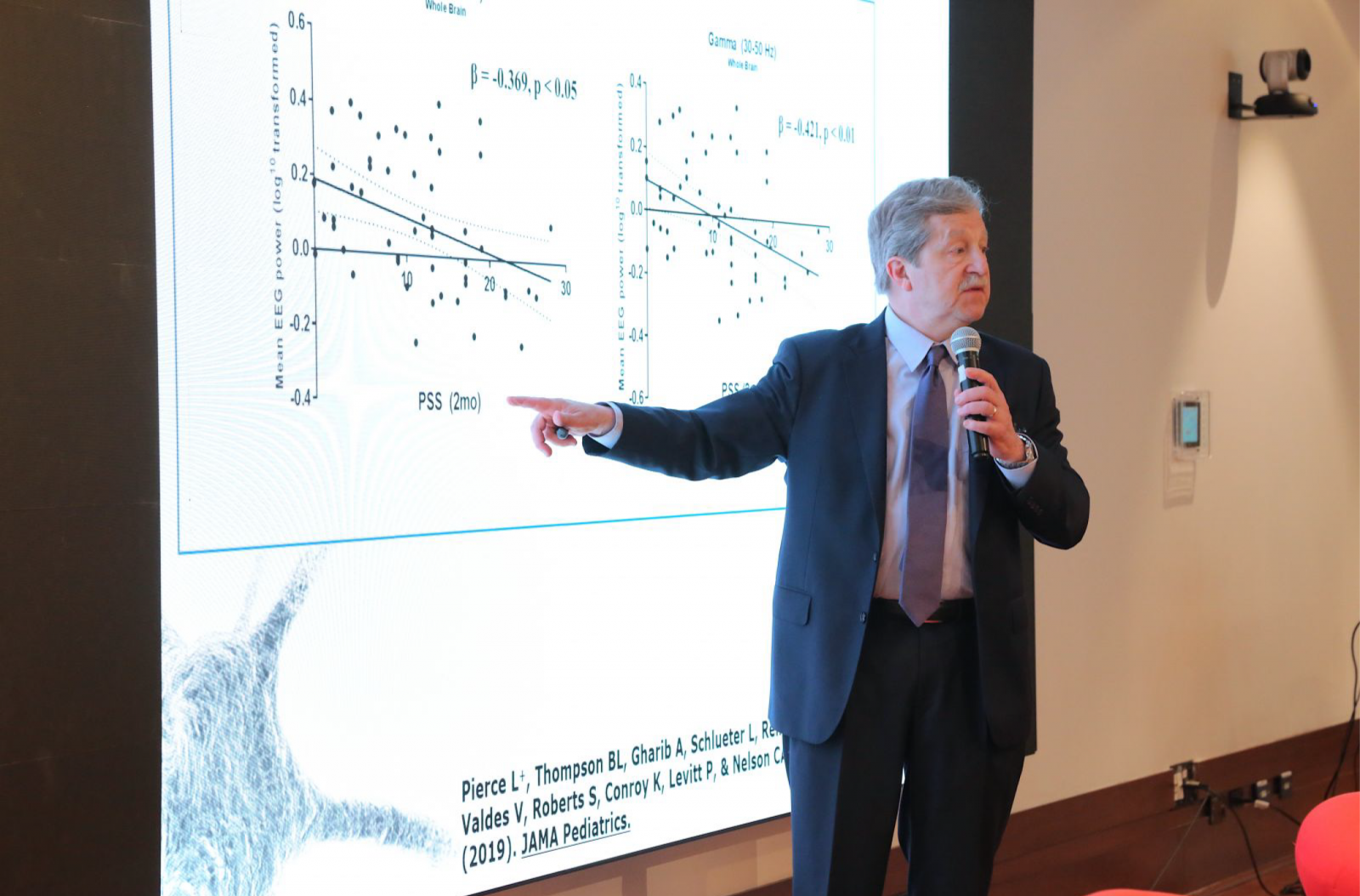
In presentation The Impact of Early Life Adversity on Child and Brain Development, Professor Charles Nelson explained how healthy experiences facilitate healthy brain development. And, by contrast adverse experiences can negatively impact brain development, especially in the first years of life when the brain undergoes the most rapid period of development and is acutely responsive to experience. When addressing the world-wide prevalence of early adversity, he highlighted the following statistics:
- The U. S. Centers for Disease Control estimates one third of the world’s children, 18 years old and under experience physical or harsh punishment or abuse.
- The United Nations estimates that at least 133–275 million children globally witness violence between primary caregivers.
- 223 million children are victims of sex trafficking each year.
From a health perspective, he provided examples on how the effects of early adversity (including neglect) can have far reaching consequences on brain, biological and psychological development. “Exposure to early adversity can cause long lasting effects including increased risks of mental (e.g., anxiety and depression) and physical health (e.g., cardiovascular disease; diabetes) disorders.” He added, “It is theoretically possible for effects to biologically cascade from one generation to the next (epigenetic effect).”
He emphasized that “…the financial and human capital costs to society are enormous; as economists say, “Pay now or pay more later.” He concluded, “If we want to reduce the burden of “disease” (both physical and psychological) in adults, we should take steps to address children growing up in adverse circumstances.”
Talk 4. Rebuilding a nation: Investing in human capital and ECD in the Republic of Rwanda
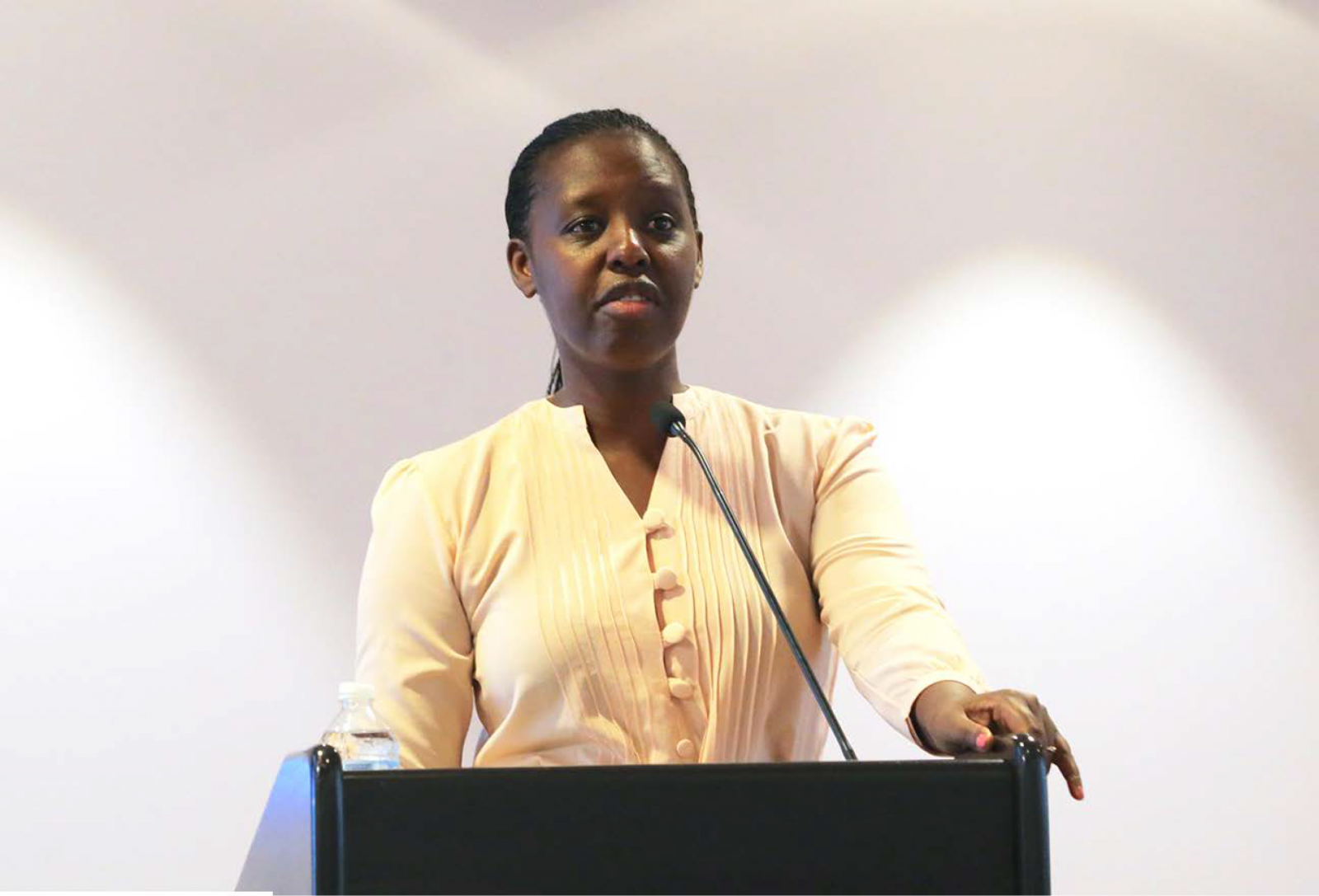
Dr. Anita Asiimwe shared highly significant achievements made by her country that included the adoption of new policies to advance ECD services. She recalled to mind the intense suffering endured by her people during the Rwanda Civil War, which claimed many lives because of the 1994 genocide. But, since that time, she reported that country leadership has achieved milestones due to its visionary, multi-sectoral plan.
Referred to as Vision 2050, the plan has put Rwanda on the road to becoming a “high-income country”, according to Dr. Asiimwe. Country leadership has identified the number one driver of future growth as human capital development, including the early years (0-6). Hence, the National ECD Program was launched, spearheaded by several ministries and partners, including civil society, academia, and the private sector.
In Rwanda, early childhood development is “owned” at the national level, village level, and all the way to the homestead level where parents are considered to be “very major stakeholders”. Dr. Asiimwe spoke of the five main areas that form the integrated ECD country-wide program. These areas include vaccination, nutrition, hygiene and sanitation, child protection, and “most importantly”, early childhood development. With respect to child protection policies, she was pleased to report that children had been removed from orphanages and placed into foster care “so that they could be taken care of early enough in life, in homes.”
“To achieve Vision 2050, we have put human capital development as the very key element.” She concluded, “We believe that the early years matter, and that’s what we are driving at”.
Talk 5. Advancing ‘The Culture of Peace’ through ECD in the People’s Republic of Bangladesh
“If we change the beginning of the story, we change the whole story”, reflected Mr. Md. Sherajul Islam as he addressed the audience. In his role as Vice Minster of the Banladesh Ministry of Health and Family Welfare, he has been integral in the adoption and implementation of policies designed to advance ECD services. He provided examples of his country’s significant achievements that he highly attributed to these key services.
He spoke of his focus on the attainment of the seventeen Sustainable Development Goals in his country. In order to reach the Global Goals, he emphasized the urgent need to focus on the development of human capital, beginning in the early years, because it is the critical determinant of long-term sustainability, and most effective approach to building ‘The Culture of Peace’.
Talk 6. ECPC—Paving the road to peace through ECD: An inclusive movement for social cohesion and justice
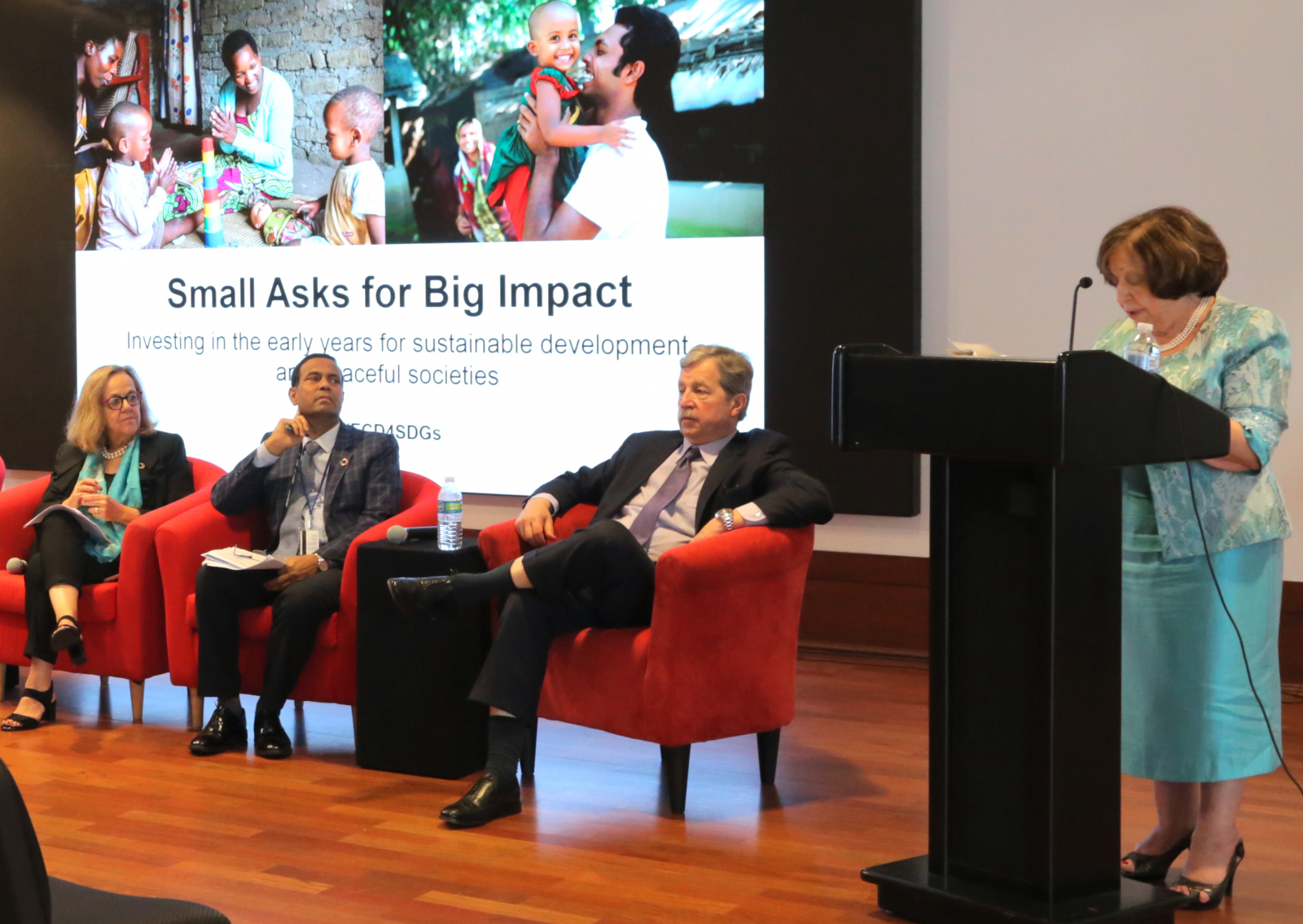
Dr. Rima Salah assured that “The advances in development, neuroscience and an emerging and well-established body of scientific evidence from multiple disciplines hold significant implications for the future of millions of children living in adversity worldwide, as well as on our thinking about creating a culture of peace and about sustaining peace in the world.” She added, “This science heralds in a new era with windows of opportunities to contribute to sustainable peace through investment in the positive early development of young children.”
To help raise the voice of families, parents and children as agents of change for peace, the Early Childhood Peace Consortium (ECPC) was formed and launched at UNICEF in September, 2013. 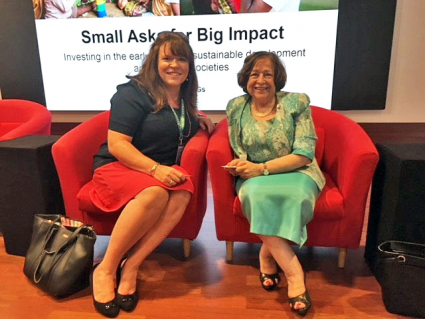 “It brought together many partners and many of them are here”, she said. “Its vision is to create an inclusive movement for peace, social cohesion, social justice, and the prevention of violence through using early childhood development strategies to enable the world community to advance peace, security and development.”
“It brought together many partners and many of them are here”, she said. “Its vision is to create an inclusive movement for peace, social cohesion, social justice, and the prevention of violence through using early childhood development strategies to enable the world community to advance peace, security and development.”
When pointing the way forward, she outlined three courses of action:
- We need to persist in the pursuit of knowledge and address the gaps in science to more fully inform policies and national qualities.
- We need to continue to design and implement quality education programs, anchored in nurturing care, while also considering ‘the triple nexus’.
- Programs should be culturally sensitive and based on what people know and parents know. It is only then that they can play the role of peace drivers starting from home, affecting the community and society.
She concluded, “Most importantly, we need to unite our strengths to advocate for universal access to early childhood development, emphasizing the urgent need for increased investment in programs for families and young children that live in situations of conflict and displacement.” She asserted, “They cannot be left behind!”
Rima Salah, Ph.D. is Chair of the Early Childhood Peace Consortium (ECPC), and former Assistant Secretary-General of the United Nations.
Talk 7. On the road to a new beginning: “We won’t be refugees anymore.”
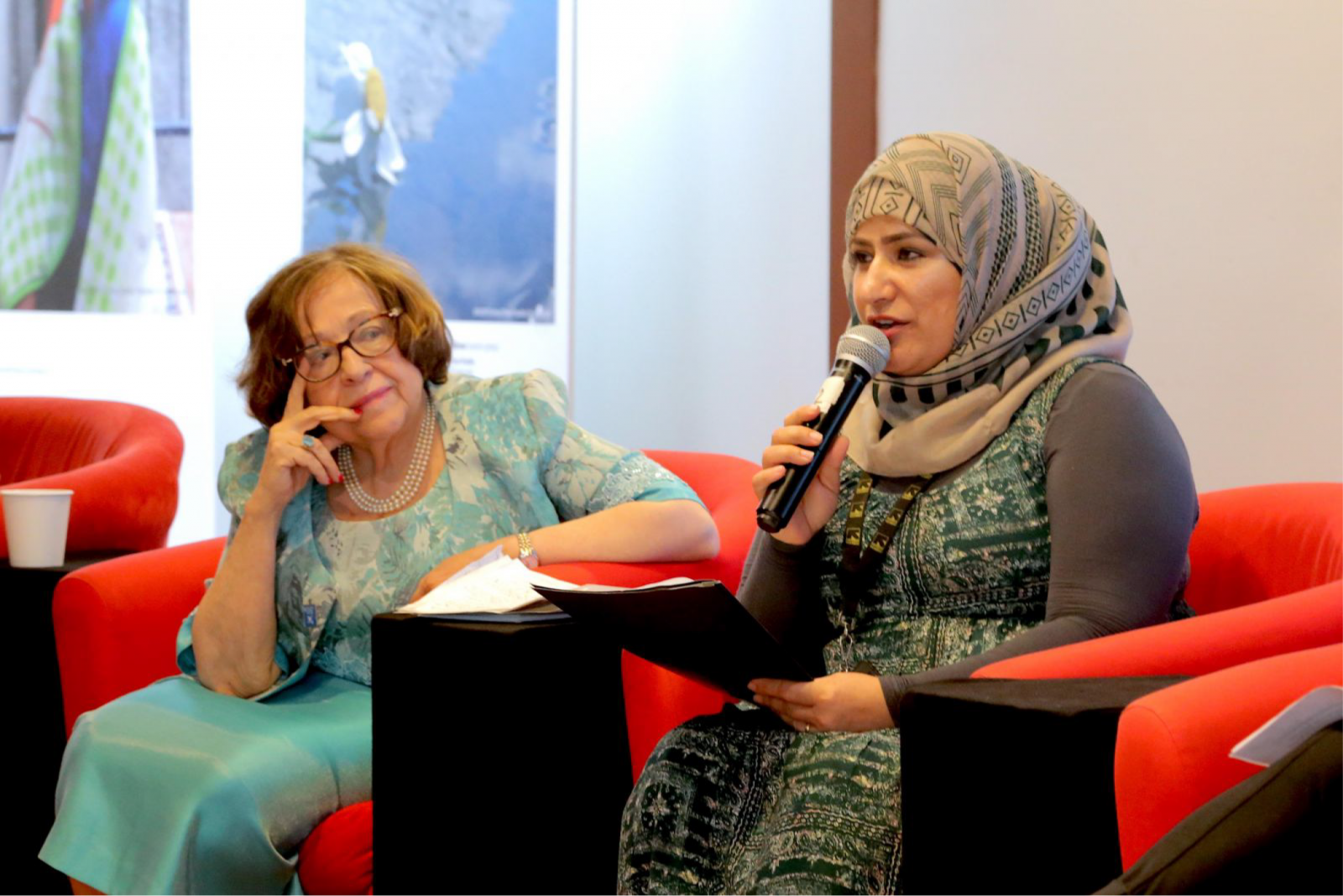
Ms. Nargis Bigzad encapsulated the essence of the event by sharing her lived experience of displacement—a story and timeline that spans a long and difficult journey from her country of origin to the United States.
Born in Afghanistan, young Nargis and her brother were relocated by their parents to Russia in an effort to keep them safe from the Russian invasion and during the Taliban years. After six and one-half years, she and her brother returned home to discover that sadly, their father had passed away. With the situation still unsafe and schools shut down for girls, Nargis and her mother and brother escaped to Pakistan where they remained for 10 years as refugees.
But, an arranged marriage forced Nargis back to Afghanistan, to an abusive husband. She soon found herself abandoned and alone with her six-day old son, and in a desperate search for employment. After serving two years in the U.S. Army as an interpreter, which she recalls being, “a dangerous and risky job for an Afghan woman”, she and her son, Rehan were granted special immigration visas to the United States. They resettled in New York City with assistance from the International Rescue Committee (IRC).
Nargis quickly secured employment as a city taxi driver. But, low wages soon forced her and Rehan into homelessness, followed by several unsuccessful attempts to relocate elsewhere. Good fortune arrived when the IRC NY office offered her a temporary marketing position that fortuitously led to her current full-time position as Direct Response Associate. “I love my job. I am a monthly contributor, and I love what I do”, she said.
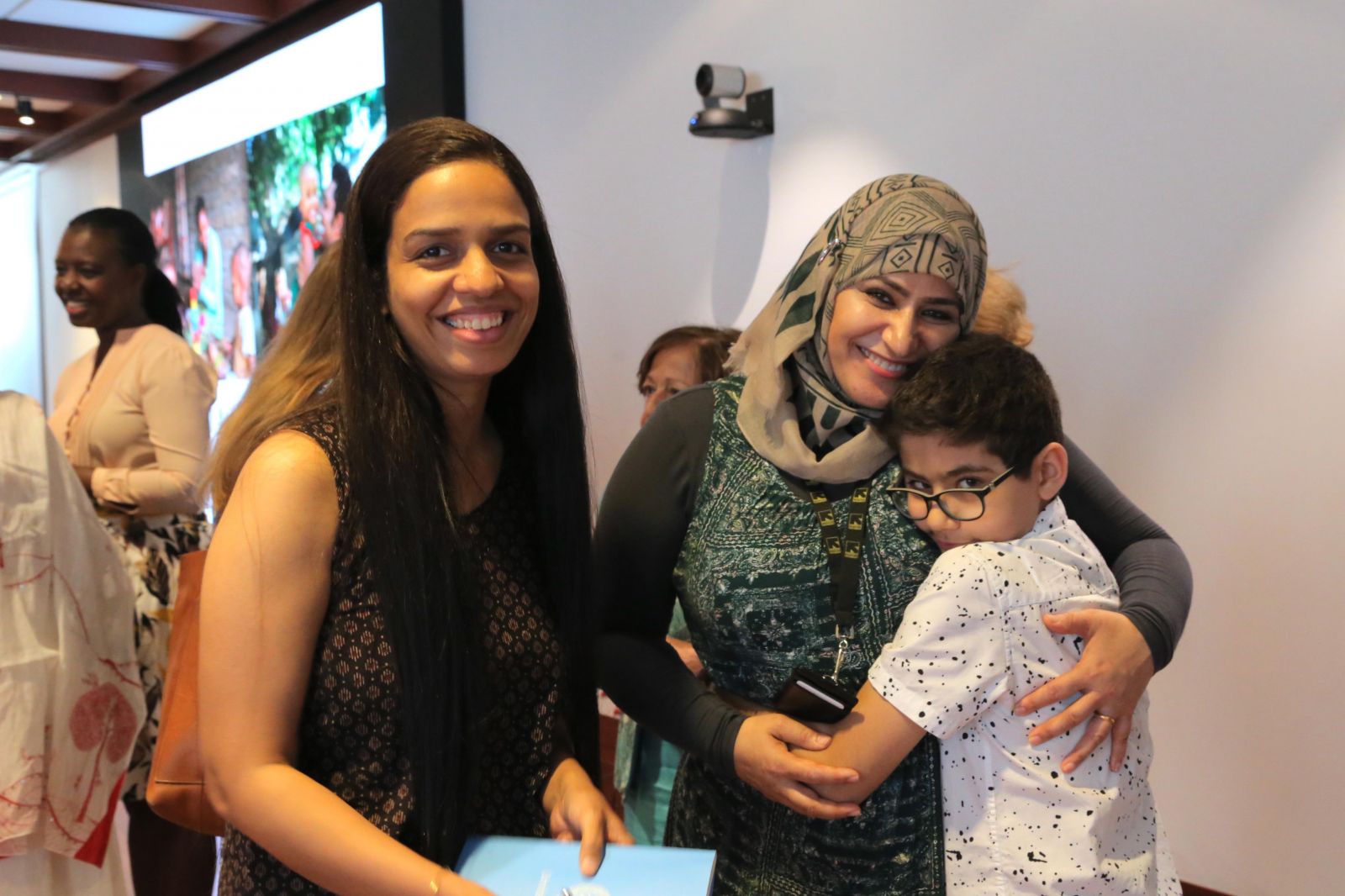
She concluded her thought provoking story of courage and determination by declaring, “We won’t be refugees anymore. We will have the same rights as U.S. citizens have and this country will be our second home!”
Ms. Nargis Bigzad is Direct Response Associate at the International Rescue Committee (IRC).
Conclusion: Be the change
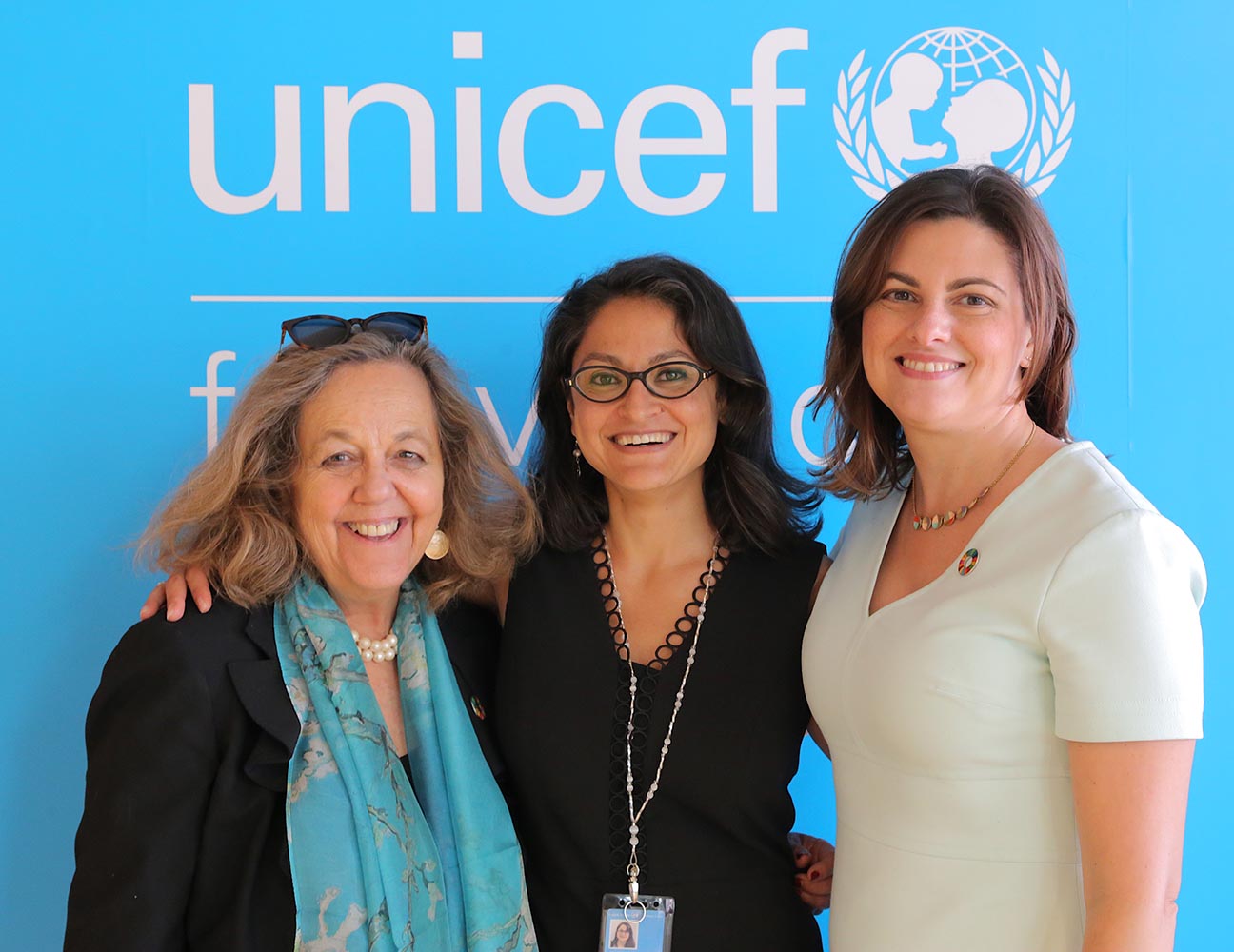
Dr. Lombardi expressed her sincere gratitude to each of the event speakers for their important contributions. She called for a commitment by all to double their efforts in disseminating this growing wealth of knowledge to further drive evolutionary and sustainable change—to benefit the lives of all children and families, at village and community, national and global levels—from generation to generation.
In conclusion, she offered the following:
This is not the time to get tired. We have to make a personal commitment to be persistent. We have to work for change and we have to believe in our hearts that everyone of us can make a difference. And more than ever, let’s heed the words of Dr. Salah and call for peace and harmony around the world so children can thrive.”
Learn more
Please visit the ECPC conference webpage Small Asks for Big Impact for more information and to access event related resources.
View on Twitter @ #ECD4SDGs.
To learn more about event co-sponsors and their work, please visit:
- The Permanent Mission of Bangladesh to the United Nations
- UNICEF
- Moving Minds Alliance
- The Permanent Mission of Rwanda to the United Nations
- Open Society Foundations
- Early Childhood Peace Consortium (ECPC)
- NGO Committee on Migration
This event was supported in part by a grant from the Foundation Open Society Institute in cooperation with the Early Childhood Program of the Open Society Foundations.
Submitted by N. Shemrah Fallon on 15 August 2019.


